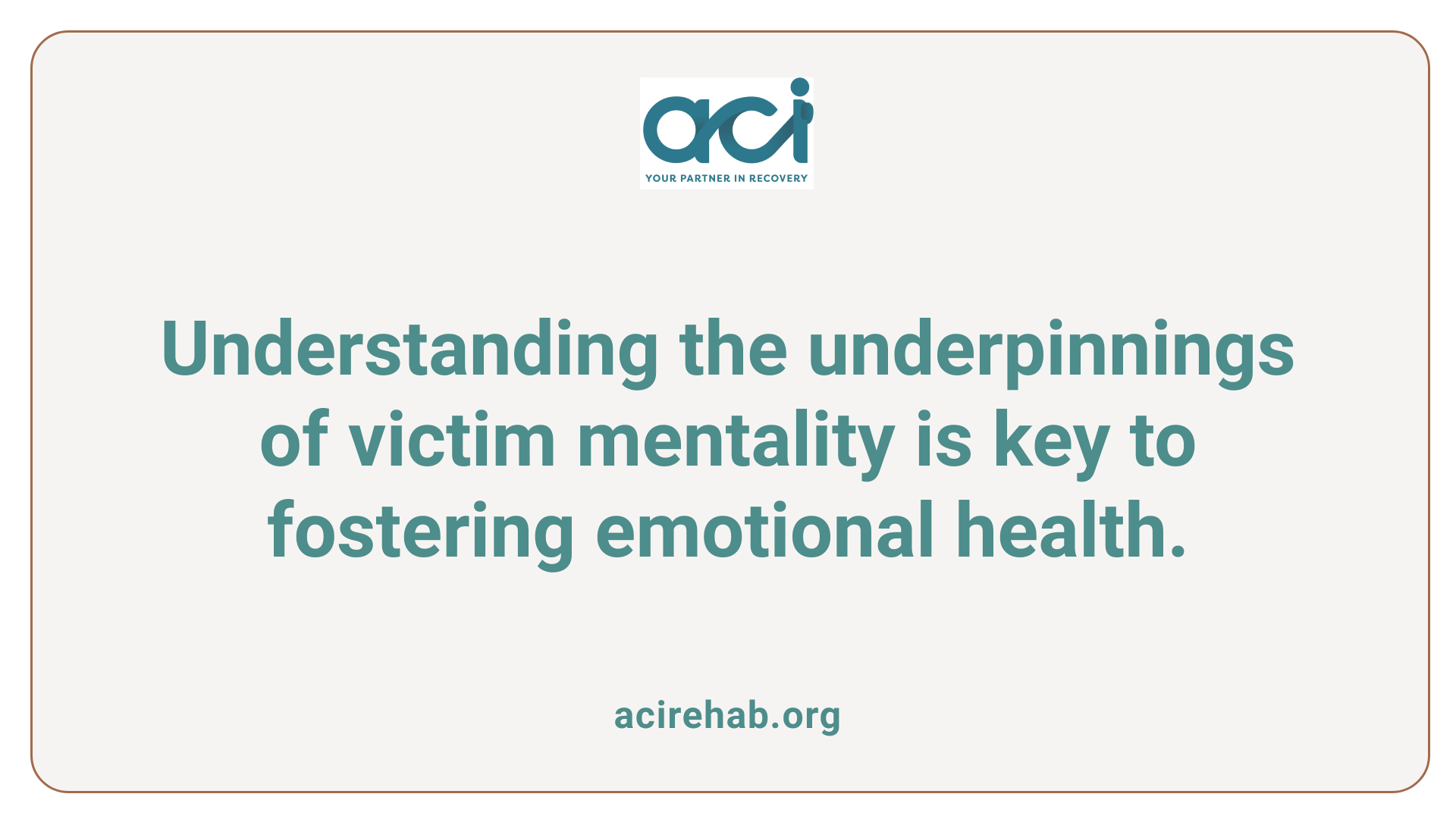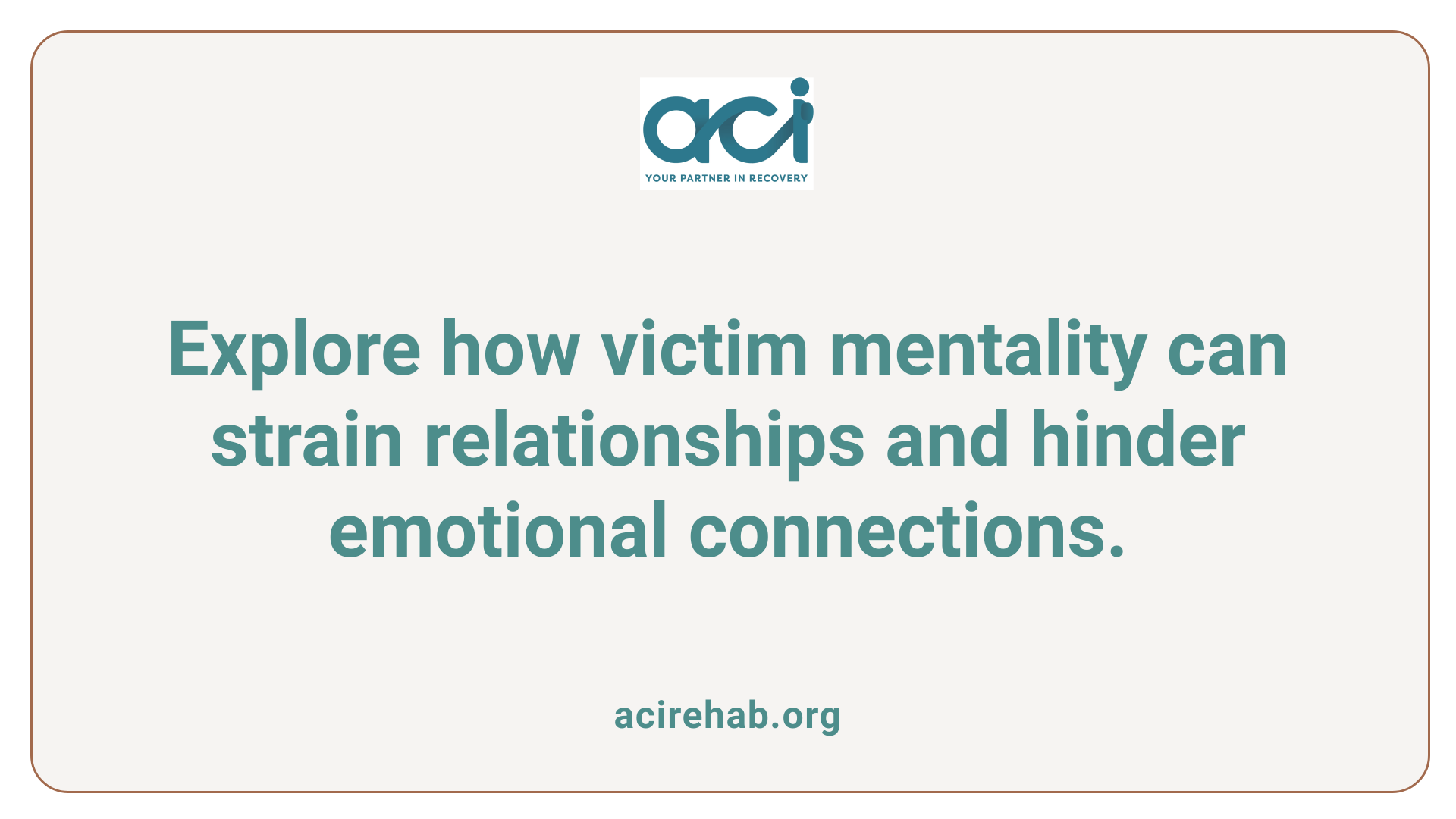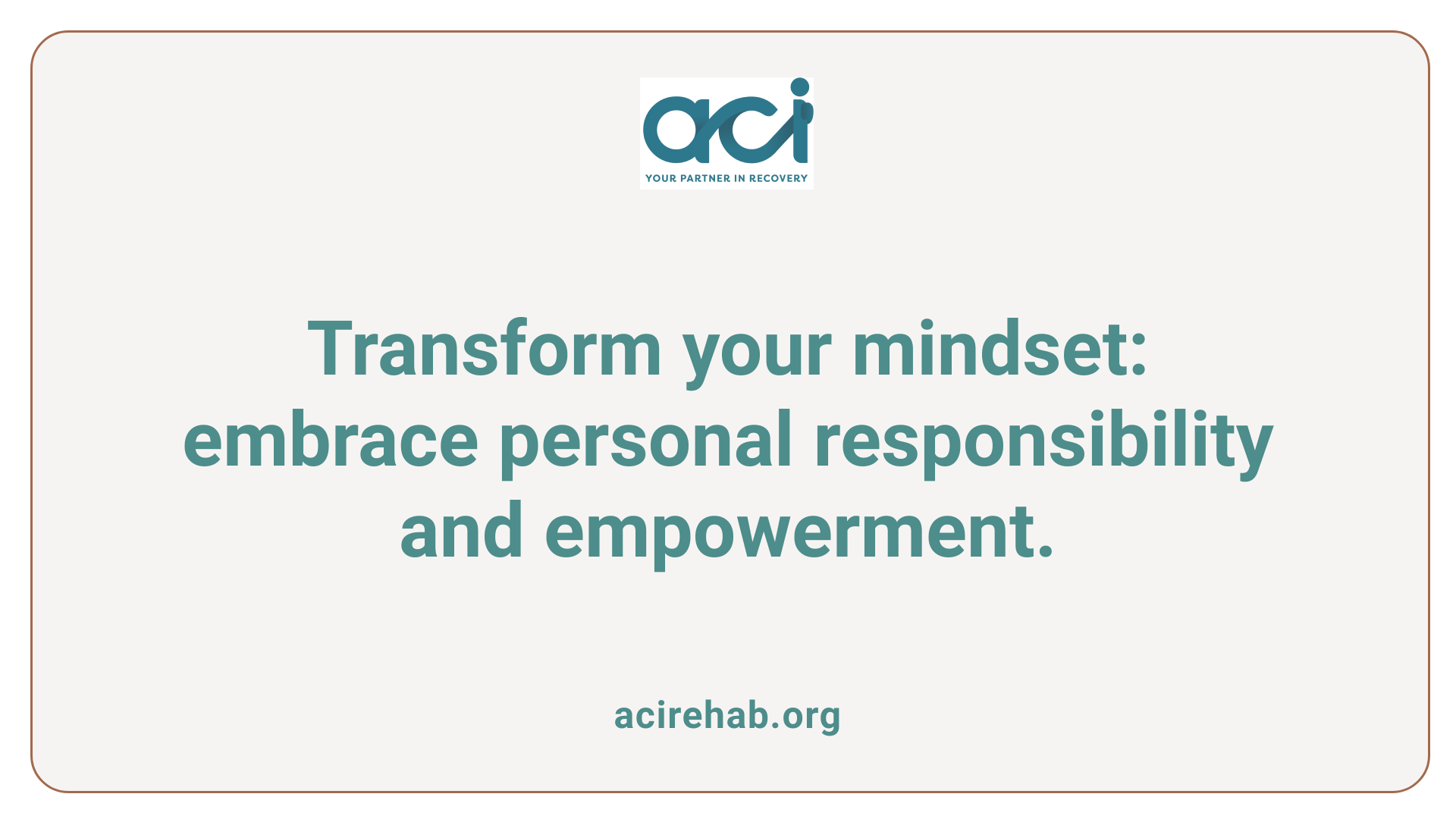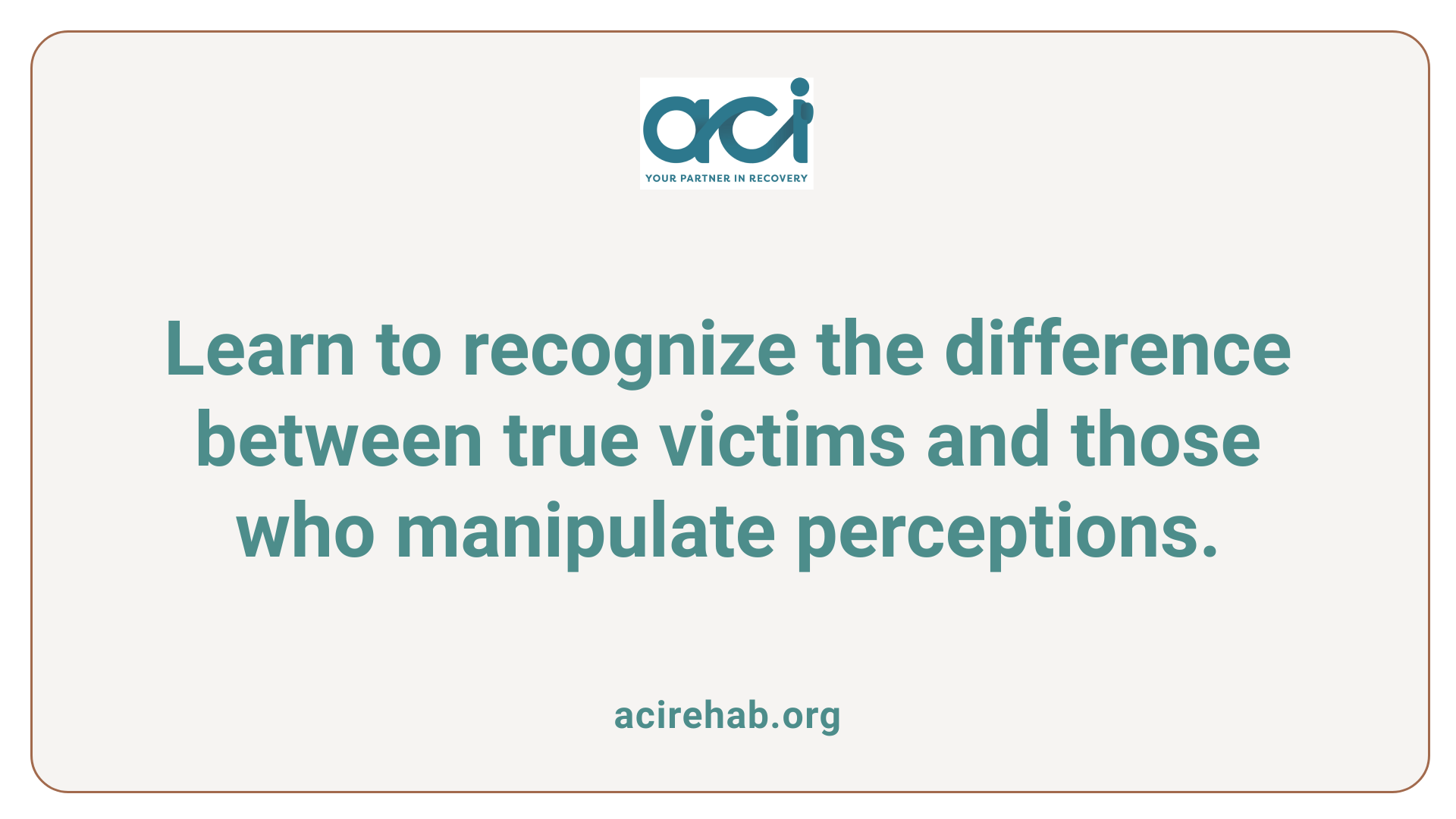Understanding Victim Mentality
The concept of ‘playing the victim’ is not merely about occasional self-pity; it is a deeper psychological pattern that can influence interpersonal dynamics, self-perception, and mental health. Individuals who engage in this behavior often amplify negative experiences to evoke sympathy and sidestep accountability for their actions. Recognizing and addressing these tendencies in oneself or others requires an understanding of the underlying psychological mechanics and the impact on relationships.
The Psychology Behind Victim Mentality

Characteristics of Victim Mentality
Victim mentality often manifests through several discernible traits. Individuals with this mindset tend to:
- Shift Blame: They frequently attribute their struggles and misfortunes to external circumstances or the actions of others, avoiding accountability.
- Exaggerate Experiences: They may magnify their negative experiences, framing them as more significant than others’ challenges.
- Display Self-Pity: Those embodying this mentality often indulge in self-pity, believing their suffering is unparalleled.
- Avoid Solutions: Rather than seeking ways to improve their situation, they might wallow in their difficulties, leading to a pattern of inaction.
This triad of behaviors fosters a cycle of negativity that can contribute to feelings of helplessness and isolation.
Psychological Roots of Victim Mentality
The psychology of victim mentality delves deeper into the emotional and psychological underpinnings of these behaviors. Several factors are at play:
- Learned Helplessness: Often rooted in past trauma, particularly during childhood, individuals may develop a belief that they have no control over their lives. This belief can become ingrained and lead them to assume a victim role by default.
- Manipulation of Sympathy: Victims may also manipulate scenarios to seek empathy from others, avoiding the responsibility for their actions. This behavior often stems from a deep-seated need for validation and acknowledgment of their pain.
- Societal Perceptions: Social constructs regarding victimhood further complicate this mentality. Individuals may recognize societal sympathy toward certain types of victims, thereby reinforcing their own victim status to gain attention and support.
Understanding these dynamics is essential in addressing the emotional distress and perpetuated cycles of helplessness often found in those with a victim mentality.
Understanding the Act of Playing the Victim
What does it mean when someone plays the victim?
Playing the victim refers to a behavior where individuals exaggerate or fabricate their experiences to portray themselves as victims. This tactic is often utilized to gain sympathy or to evade accountability for personal actions. Individuals who engage in this behavior frequently complain about their situations without actively seeking improvements, viewing their hardships as more significant than those faced by others, and consistently blaming others for their problems.
Recognizing Behavioral Tendencies
Common signs of playing the victim include:
- Constant complaining: Regular grievances without attempts to take action.
- Exaggerated experiences: Downplaying others’ challenges while magnifying their own.
- Blame-shifting: Avoiding personal responsibility by attributing their situation to external factors.
- Manipulative tactics: Eliciting sympathy to control the perceptions of those around them.
Motivations Behind Victim Behavior
The motivations for such behavior can stem from various psychological factors:
- Learned helplessness: A state where individuals feel powerless to change their circumstances, leading to a cycle of self-pity and avoidance of responsibility.
- Narcissism: Individuals with narcissistic traits may play the victim to draw sympathy, reinforce their self-centeredness, and manipulate others’ feelings.
- Attention-seeking: Some might engage in this behavior to receive validation and support, reflecting deeper insecurities.
By recognizing these patterns, individuals can begin to understand their behaviors more clearly and consider the importance of taking personal responsibility to foster healthier relationships.
Identifying Common Manipulative Tactics
What are some common tactics associated with playing the victim?
Playing the victim is often employed as a manipulation tactic by individuals seeking sympathy or to avoid accountability for their actions. Here are some prevalent tactics:
- Exaggerating Hardships: Individuals may inflate their struggles, portraying their experiences as vastly worse than those of others. This not only gains them sympathy but also shifts the focus away from any personal responsibility.
- Inducing Guilt: By presenting themselves as perpetually wronged or in distress, they instill guilt in others, compelling them to act compassionately or to comply with their wishes.
- Avoiding Accountability: A common behavior is to refuse responsibility for negative outcomes. Instead, the individual redirects blame towards others, claiming external factors led to their situation.
- Dependency on Others’ Support: Victims often rely heavily on others’ emotional and practical support, creating a dynamic where their needs overshadow those of their supporters.
- Playing with Emotions: Through displays of helplessness or distress, victims can evoke strong emotional reactions, manipulating others to provide comfort or assistance.
Relationship dynamics
Navigating relationships with individuals who consistently portray themselves as victims can be challenging. They may exhibit:
| Behavior | Impact on Relationships | Resolution Strategies |
|---|---|---|
| Blame-shifting | Distrust and resentment develop | Encourage personal accountability |
| Seeking constant validation | Creates dependency | Set emotional boundaries |
| Emotional manipulation | Erodes trust and well-being | Remain objective and balanced in discussions |
Overall, maintaining healthy boundaries and encouraging self-reflection can help mitigate the adverse effects of manipulative victimhood in relationships.
Spotting Victim Mentality in Yourself and Others
How can you identify signs of victim mentality in yourself or others?
Identifying signs of a victim mentality involves looking for consistent behaviors and thought patterns that indicate blame and avoidance of personal responsibility. Common indicators include:
- Blame-shifting: Individuals often place responsibility for their problems on external factors, refusing to acknowledge any role they may have played.
- Exaggerated self-pity: A recurrent focus on one’s hardships can signal an inability to move forward. These individuals may frequently express feelings of helplessness.
- Lack of accountability: They often resist constructive feedback, interpreting it as personal attacks rather than opportunities for growth.
- Difficulty in relationships: Those with a victim mentality may struggle to maintain healthy connections, stemming from their perception of being perpetually wronged. This often leads to isolation.
- Psychological behaviors: Playing the victim can manifest as self-soothing through maladaptive behaviors. For instance, they may indulge in negative self-talk or wallow in self-pity, evading personal growth.
Recognizing these patterns is essential in fostering self-awareness. This awareness can shift perceptions, encouraging individuals to embrace empowerment and resilience, rather than victimhood.
The Impact of Victim Mentality on Relationships

How does victim mentality impact relationships?
Victim mentality can significantly strain relationships by fostering a sense of dependency and resentment. Individuals exhibiting this mindset often view themselves as powerless, leading to manipulation tactics where they elicit sympathy from others. This behavior can drain the emotional resources of partners or friends, leading to frustration and burnout.
The tendency to blame external forces for personal problems undermines accountability. When one partner feels perpetually victimized, it creates an imbalance where the other partner must constantly affirm their worth and address their grievances. Over time, this dynamic may foster resentment.
While relationships thrive on emotional support and understanding, they also require individuals to take responsibility for their actions. Recognizing individual potential is essential for mutual growth. Setting boundaries becomes crucial; it allows individuals to support their partners without sacrificing their well-being.
In summary, balancing empathy with clear boundaries enables healthier connections, ultimately fostering a relationship where both individuals can grow and support each other without one party feeling overwhelmed.
Steps to Overcoming Victim Mentality

What are some strategies for overcoming victim mentality?
Overcoming a victim mentality requires commitment and active participation in personal growth. Here are effective strategies:
-
Take Responsibility: Acknowledging your role in your experiences is crucial. This begins with recognizing your emotions and understanding how your reactions contribute to situations.
-
Engage in Self-Reflection: Identify negative thought patterns that perpetuate victimhood. Reflective practices, such as journaling, can aid in awareness and promote a growth mindset.
-
Practice Self-Compassion and Self-Care: Healing from past trauma is vital. Show yourself kindness and prioritize activities that nurture your emotional well-being.
-
Develop Problem-Solving Skills: Focus on solutions rather than dwelling on problems. Setting realistic goals transforms feelings of helplessness into actionable tasks.
-
Seek Professional Help: Engaging with a therapist or counselor can provide support in navigating emotions and learning to address challenges constructively.
By implementing these strategies, individuals can gradually reclaim their power and shift from a mindset of victimhood to one of empowerment.
Dealing with Those Who Play the Victim
Handling Victim Behavior
Dealing with someone who constantly portrays themselves as a victim can be challenging. Start by actively listening to their concerns, as this demonstrates compassion. Acknowledge their feelings without endorsing their unproductive narratives. It’s essential to gently challenge their perspective; ask questions that prompt reflection on their role in their circumstances. Encouraging personal accountability can shift the focus away from blame-shifting and towards proactive solutions.
Boundary Setting
Setting boundaries is crucial when engaging with individuals who have a victim mentality. Establish limits on how much time and emotional energy you’re willing to invest. Remind yourself that while it’s vital to be empathetic, it’s also important not to let their negativity drain you. Recognize your own needs and maintain a clear distinction between your feelings and their problems. This protects your mental health and encourages them to seek solutions rather than indulging in self-pity.
Empowerment Over Victimhood
Promote positivity by encouraging them to identify actionable steps they can take to improve their situation. Suggest small, manageable goals that foster a sense of control and empowerment. Encouraging self-love and appreciation for their strengths can help shift their mindset from one of victimhood to personal empowerment.
The Role of Learned Helplessness in Victim Mentality
Learned Helplessness as a Precursor
Learned helplessness is a psychological state where individuals feel powerless to change their circumstances, often stemming from past trauma or adverse experiences. This feeling can lead to a victim mentality, as individuals come to believe that whatever they do, they cannot influence their outcomes. This mindset not only diminishes their efforts to seek solutions but also reinforces a belief that external forces are to blame for their unhappiness.
Psychological Patterns
Individuals exhibiting a victim mentality frequently show signs of cognitive distortions, which cause them to misattribute their difficulties solely to external factors. This distortion supports a narrative of victimhood, preventing any recognition of personal agency.
Additionally, these individuals may
- Externalize blame: They refuse to take responsibility for their actions, amplifying their feeling of victimization.
- Wallow in self-pity: They focus on their problems rather than seeking constructive solutions, which perpetuates feelings of helplessness.
- Exaggerate hardships: By inflating the severity of their challenges, they seek sympathy and avoidance of accountability.
In summary, learned helplessness underpins the victim mentality by limiting self-efficacy and encouraging blame-shifting, making it difficult for individuals to reclaim control over their lives.
Differentiating Genuine Victimhood from Victim Playing

Authentic vs. Exaggerated Victim Behavior
Genuine victimhood arises from real experiences of trauma or loss. Individuals in this category seek support and understanding from others without manipulating emotions. They often express their feelings and struggles truthfully, fostering authentic connections.
In contrast, those who play the victim exaggerate their experiences or fabricate emotions to elicit sympathy. They typically show signs of entitlement, expecting others to cater to their perceived needs. For example, an individual might use their injury to manipulate a colleague into taking on extra work, rather than simply sharing their situation and seeking help respectfully.
Impact on Others
The distinction between authentic expressions of vulnerability and manipulative victim behaviors is significant. Authentic individuals inspire empathy and support, while those playing the victim can drain emotional resources and create a toxic atmosphere. This manipulative approach often leads to strained relationships, as it fosters resentment and frustration among peers.
Understanding these differences can aid in navigating social interactions and maintaining healthy boundaries, ensuring that one’s emotional space is preserved while still supporting those in true distress.
A Path Towards Resilience and Self-Empowerment

Building Resilience
To transform a victim mentality into a more empowered viewpoint, individuals can embark on a journey to build resilience. Resilience involves adapting well in the face of adversity, trauma, or significant stress.
Strategies for fostering resilience include:
- Self-Reflection: Taking time to understand one’s feelings and the motivations behind them.
- Setting Realistic Goals: Small, achievable objectives can enhance a sense of control and accomplishment.
- Embracing Change: Accepting that change is a part of life can help mitigate feelings of helplessness.
Transforming Mindset
A shift from a victim mentality to a mindset of empowerment requires conscious effort. This transformation involves:
- Practicing Gratitude: Focusing on what one has, rather than what is missing, fosters a positive outlook.
- Taking Accountability: Recognizing one’s role in past situations can inspire proactive change.
- Building Empathy: Understanding others’ perspectives can reduce self-centeredness and cultivate connections.
| Strategy | Benefit | Application |
|---|---|---|
| Self-Reflection | Understanding emotions | Daily journaling or meditation |
| Setting Realistic Goals | Enhanced feeling of control | Creating actionable to-do lists |
| Embracing Change | Reducing helplessness | Accepting new experiences with an open mind |
| Practicing Gratitude | Encouraging a positive mindset | Writing a gratitude journal |
| Taking Accountability | Empowering personal growth | Analyzing past situations without blame |
| Building Empathy | Strengthening relationships | Engaging in active listening or counseling |
By embracing these strategies, individuals can embark on a transformative journey towards resilience and self-empowerment, moving away from a cycle of victimhood into a space of growth and responsibility.
Towards Healing and Self-Responsibility
Understanding the complex dynamics of playing the victim is crucial for fostering healthier relationships and promoting personal growth. While victimhood can stem from genuine adversities, perpetuating this mentality through manipulation or learned helplessness hinders both personal and relational development. By recognizing these patterns, setting clear boundaries, and encouraging self-responsibility, individuals can pave the way towards healing and empowerment. Supportive measures such as therapy, self-reflection, and the cultivation of empathy can significantly aid in breaking free from a victim mindset, encouraging a more balanced and resilient approach to life’s challenges.
References
- Playing the Victim: Understanding and Stopping the Cycle
- 3 Ways to Tell When Someone Is Playing the Victim
- Victim Mentality: Causes, Symptoms, and More – WebMD
- 14 Clear Signs Someone Is Always Playing the Victim – LifeHack
- How To Tell if Someone Is Playing the Victim and Respond
- Victim Mentality: 16 Signs and Tips to Deal with It – Healthline
- How to Spot Someone Playing the Victim | What Is Codependency?
- We all want to play the Victim sometimes – www.yourtimetogrow.com
- How to Stop Playing The Victim in Your Life | By Gustavo Razzetti
- Best Strategies to Help You Deal With Someone Who Plays the Victim

